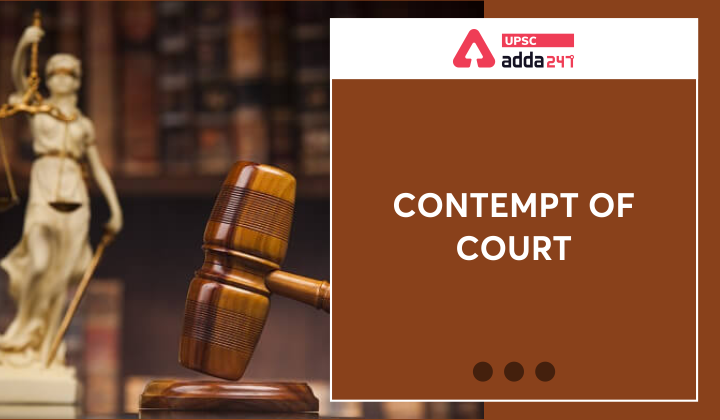Table of Contents
Contempt of Court is a critical legal tool aimed at safeguarding the authority, integrity, and dignity of the Judiciary. It plays a crucial role in ensuring compliance with Court orders and preventing obstruction of justice. The law of Contempt empowers Courts to take action against individuals or entities that disrespect or disobey their authority. This article delves into the concept, types, and punishment for Contempt of Court while also addressing criticisms against it.
What is Contempt of Court?
Contempt of Court refers to actions that defy, disrespect, or disobey the authority, justice, or dignity of a Court of law. It includes behavior that tends to obstruct the administration of justice or undermines the Court’s proceedings. The purpose of Contempt laws is to maintain the sanctity and proper functioning of the judicial process. Contempt is a broad term encompassing a range of actions, from non-compliance with Court orders to acts that scandalize or belittle the Judiciary.
Types of Contempt of Court
Contempt of Court is broadly categorized into two types: Civil and Criminal Contempt.
- Civil Contempt: Defined under Section 2(b) of the Contempt of Courts Act, 1971, Civil contempt refers to the willful disobedience of any judgment, decree, direction, order, writ, or other Court processes. It also includes the willful breach of an undertaking given to a Court. For instance, failure to comply with a Court order for the transfer of property or assets constitutes Civil contempt.
- Criminal Contempt: Under Section 2(c) of the Contempt of Courts Act, Criminal contempt encompasses actions that:
- Scandalize or tend to scandalize the authority of the Court.
- Prejudice or interfere with judicial proceedings.
- Obstruct or interfere with the administration of justice in any manner.
- Criminal contempt is often invoked when a person’s actions or publications aim to undermine the authority of the Judiciary or bring the administration of justice into disrepute.
Punishment for Contempt of Court
The punishment for Contempt of Court is laid down in Section 12 of the Contempt of Courts Act, 1971. Both Civil and Criminal contempt carry the same penalties, which include:
- Imprisonment for up to six months.
- A fine that may extend to Rs 2,000.
- Both imprisonment and a fine can be imposed.
In addition to these punishments, the Court can discharge the contemnor if an apology is made to the Court, provided the Court accepts that the apology is made in good faith and is genuine. However, the Court is not bound to accept every apology.
Criticisms Against Contempt of Court
While Contempt of Court laws serve an essential function, they have also faced several criticisms:
- Colonial Legacy: Contempt laws in India are often criticized as remnants of British colonial rule. Interestingly, the United Kingdom itself has abolished the crime of scandalizing the Court, yet it remains in force in India.
- Infringement on Freedom of Speech: Article 19(1)(a) of the Indian Constitution guarantees freedom of speech and expression, but this right is curtailed by Contempt laws. Critics argue that criminal contempt, particularly the clause of scandalizing the Court, suppresses valid criticism and public discourse about the Judiciary.
- Judicial Overreach: There are concerns that Contempt laws provide the Judiciary excessive powers, leading to potential misuse and judicial overreach. It is argued that Judges may invoke contempt for personal reasons rather than to protect the dignity of the Judiciary.
- Vagueness: The definitions of Contempt, especially in criminal contempt cases, are often considered vague. Phrases such as “scandalizing the Court” and “lowering the authority of the Court” are open to subjective interpretation, leading to inconsistent application.
Notable Case Laws
- P.N. Duda vs. V.P. Shiv Shankar (1988): In this case, the Supreme Court observed that Judges cannot use contempt jurisdiction to uphold their own dignity. The Court emphasized that India is a democratic country where citizens have the right to criticize the Judiciary, provided the criticism does not obstruct the administration of justice.
- Arundhati Roy Case (2002): The author Arundhati Roy was held guilty of Contempt of Court for her critical remarks against the Judiciary. The case highlighted the tension between freedom of speech and contempt laws, as the Court emphasized that no one is above the law, including those who criticize it.
- Justice Karnan Case (2017): Justice C.S. Karnan, a sitting Judge of the Calcutta High Court, was sentenced to six months’ imprisonment for contempt. This marked the first time a sitting Judge was sentenced to jail, raising questions about judicial accountability and the limits of contempt powers.
Conclusion
Contempt of Court laws are integral to maintaining the respect and authority of the Judiciary. However, there is a need to balance these laws with the fundamental right to freedom of speech. Reforming contempt laws by restricting them to cases of willful disobedience of Court orders, as recommended by the Law Commission, could help resolve many criticisms. The Judiciary, as the protector of Constitutional rights, must exercise its contempt powers judiciously to uphold both the dignity of the Courts and the democratic principles of free speech.



 TSPSC Group 1 Question Paper 2024, Downl...
TSPSC Group 1 Question Paper 2024, Downl...
 TSPSC Group 1 Answer key 2024 Out, Downl...
TSPSC Group 1 Answer key 2024 Out, Downl...
 UPSC Prelims 2024 Question Paper, Downlo...
UPSC Prelims 2024 Question Paper, Downlo...





